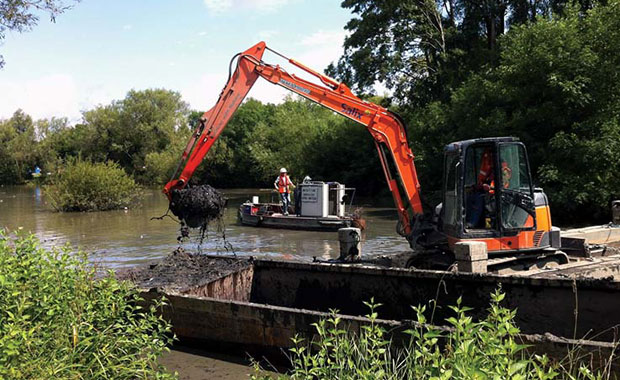Desilting Stillwaters
Students from the University of Michigan are developing a low-cost way to increase crop yield and reduce the use of fertilizers for Indian farmers. In a year-long study in India’s southeastern state of Telangana, the students are using silt dug up from ponds during the dry season as fertilizer for farm fields. The results are stunning: The silt reduced the use of fertilizers by 36 percent and increased the crop yield by nearly 50 percent. “The most striking finding is that it reduces greenhouse emissions from less fertilizer use by 50-to-90 percent,” said John Monnat, a graduate student in U-M’s Taubman College of Architecture and Urban Planning.
The idea for the project started with Mr Adithya Dahagama, a graduate student in the U-M School of Natural Resources and Environment, whose father is a farmer in the region. Mr Dahagama worked with the Hyderabad-based nonprofit FREEDOM on a similar project before coming to U-M. There’s been no comprehensive study conducted to see if silt application worked, and what were the successes,” said Mr Dahagama, who is pursuing a dual degree at SNRE and the Ford School of Public Policy. Local officials have noticed the results. Last year, the Telangana Government introduced Mission Kakatiya—a large-scale program to desilt 46,000 ponds over the next five years. The impact will be felt across 11,000 villages and will affect 21 million villagers.
While the government has not acknowledged if the results from U-M students led to Mission Kakatiya, they have supported the research by the students. These ponds, built in the region around the 13th century, store rainwater from the monsoon season and form an intricate part of farming in the area. Over time, silt has been filling the ponds, reducing their capacity. Most of the desilting of the ponds happens during the summer months when the tanks are dry.
Mr Monnat and Mr Dahagama also worked with Mr Leon Espira, a student in U-M’s School of Public Health. They were part of the Dow Sustainability Fellows program at the U-M Graham Sustainability Institute. “I would never have gotten a chance to learn about a new country and look at the impact of our program otherwise,” Mr Espira said.
Espira, who grew up in Kenya, is exploring the health effects of desilting the ponds. He said that Telangana has some of India’s highest amount of cases of fluorosis, which darkens the teeth and leaves bones crooked.
The researchers are also working with the Central Research Institute for Dryland Agriculture in Hyderabad, the capital city of Telangana, to collect and test soil and water samples before and after desilting.











Comments.